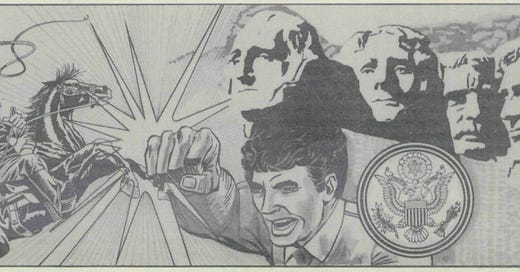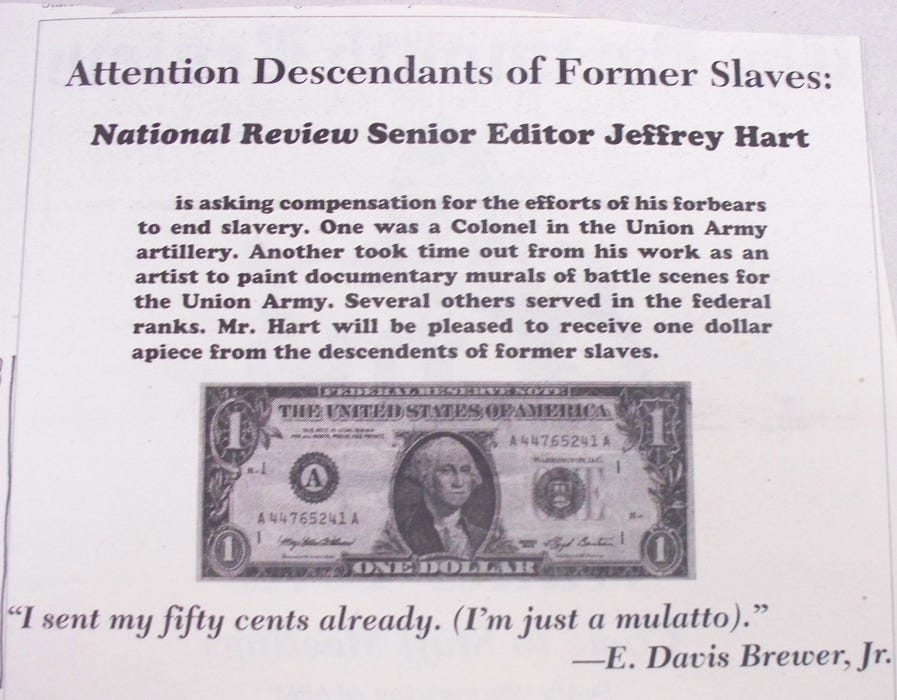One of the theses of my book manuscript is that conservative intellectuals’ principles regarding America’s political structure usually map closely on to their political needs and experiences. When their political strength is in Congress, well, that’s what the Founders’ intended to be the preeminent branch of government. Of course we shouldn’t have an activist judiciary, because lawmaking is the legislative branch’s role… Unless that Supreme Court majority is a conservative one reversing badly decided law.
I am less interested in the theoretical merits of these specific arguments than I am tracking conservatives’ historical use of them. I use the Congressional supremacy argument as a case in point particularly because it was so well established in conservative intellectual circles. One described it as the “settled and received view among American conservatives.” Conservatives have “all but unanimously opposed to a strong and activist Presidency.”
A good part of the motivation for finding that Congress is supreme, I think, comes from the conservatives’ experience since the 1930s. First they had to deal with FDR and the New Deal and Truman, then the frustration of Eisenhower, and finally Kennedy and especially LBJ. The main place conservatives had political strength was in Congress, where they could make alliances with Southern and other conservative Democrats to sometimes halt the presidents’ generally liberal moves. Their preference for Congress over the presidency reflected the realities of their own political strengths and weaknesses. (To some extent, too, for some it reflected a distrust of the modern state, which is defined to some extent, for good or ill, by the executive.)
Two of the key expositors of Congressional supremacy argument, from pretty different presuppositions, were James Burnham and Willmoore Kendall. At the time and in their intellectual universe, these two were among the top thinkers within the movement. The only people regarded as perhaps superior (Leo Strauss, Eric Voegelin, for example) kept the movement at bay. In any case, both Burnham and Kendall made forceful arguments that, as I quoted above, became the received wisdom. I summarize their cases here.
Times change, though, and if my argument holds any water, we should be able to see new conservative arguments arise with new political realities. So I am especially interested in hinge moments and emergent arguments. One good example is the late 1960s and early- to mid-1970s. The election of Richard Nixon in 1968 – even with the potential spoiler of George Wallace – suggested to a number of right-wing strategists that the long-dreamed of realignment was finally taking place. Since at least the 1950s, conservatives had looked longingly at the South and hoped to make official the conservative alliance that had stymied parts of the New Deal. A conservative party propelled by Midwestern, Western, and Southern voters could simultaneously jettison the hated Eastern liberals and permanently destroy the New Deal coalition that allowed Democrats to dominate the federal government for decades.
Did Nixon’s victory in 1968 and especially 1972 suggest this realignment was becoming a reality? Kevin Phillips’ 1969 book The Emerging Republican Majority and William Rusher’s 1975 The Making of the New Majority Party argued in the particulars, but essentially said, yes, it could be so.
If conservative politicians are suddenly competitive at the federal level – at least for the presidency – we should expect to see conservative intellectuals revising their previous arguments.
Enter Jeffrey Hart.
Hart’s an interesting character. He was an English professor, trained in criticism at Columbia in the outstanding English department of the era. Denied tenure at Columbia where he taught after earning his doctorate there, he spent the rest of his career at Dartmouth. Hart was a conservative, and a pugnacious one. He wrote for and ultimately became an editor at National Review, and also worked as a speechwriter for both Nixon and Reagan. More than anyone, Hart moved between conservatism’s snobbish traditionalism – he wrote literary criticism and books about arête – and populism. Hart was a pretty serious thinker; he was also a troll. He collected dirty jokes and enjoyed antagonizing faculty liberals. At Dartmouth he mentored Dinesh D’Souza and Laura Ingraham as the faculty advisor for The Dartmouth Review, the smashmouth student journal that launched D’Souza and Ingraham and helped mainstream “own the libs” conservatism.[1]
Combining his populist and analytic halves, in 1974 Hart began to argue in National Review that conservatives were wrong to oppose a strong presidency. (And as an intellectual historian, I am delighted Hart explicitly set himself against both Kendall and Burnham.)
“Like many conservatives,” Hart wrote, “Kendall viewed the ‘strong’ President as the instrument for imposing the liberal axioms by making end runs around the Congress. The Congress was the locus of resistance, usually successful resistance, to liberal initiatives.” So far so conventional. But, Hart suggests, this assessment was “an illusion.” Far from representing a universal dictum, FDR was contextual and transitory. When Kendall and Burnham wrote, “Meditating on the Presidency under the shadow of FDR, it was plausible to read the messianic Presidency backward into history, and also forward.”
But times had changed. Because, with the Right’s new theory of the majority, winning the presidency was suddenly in play. As Hart put it, consciously acknowledging the new stakes, “It is highly unlikely in the foreseeable future that a liberal presidential contender can put together the disparate elements of the old New Deal coalition or even some analogy of it to form a liberal presidential majority.”
So, should conservatives applaud Gerald Ford’s de-imperializing of the presidency? Or side with liberals newly concerned about the executive branch? Did Watergate suggest – as it did to James Burnham– that Nixon was the latest president with Caesarist tendencies?
No, thought Hart. “There is another possibility.” “The meaning of the Presidency in the American political equation has changed.”
Hart knew he was overturning settled doctrine. He made his argument tentatively, but I would say very confidently (“if this is true, which I think it is” sort of thing). Two things had changed.
The first major change was “the steady growth of the federal bureaucracy, which, though nominally part of the "executive branch," actually operates with considerable autonomy.” In other words, Hart articulated early a critique of the Administrative or Deep State. “No matter who the people actually vote for,” Hart contended, “they end up being governed by the same semipermanent bureaucrats and quasi-autonomous agencies.”
Of course, James Burnham had noticed this too in his study of Congress. He referred to the rise of a Fourth Branch of Federal government. Reflecting his admiration for managers and technicians, though, Burnham exhibited some comfort with it, though. He argued even though the Founders didn’t foresee a permanent bureaucracy, as another diffusion of power it was within the tradition – and may even be salutary. Unless it grows too big and becomes preeminent itself.
Hart took a more straightforward view in that the permanent bureaucracy was either ipso facto bad or already too strong. And “the only way these agencies can be diverted, cut back, or eliminated is through the action of a powerful President who is willing virtually to go to war within his own executive branch in order to carry out his mandate.” That is to say: we need a “powerful and activist” Executive to smash the Administrative State, in order to restore the Executive to its proper place. A Nixon partisan, Hart thought he had made modest steps in this direction before Watergate.
The second, greater change – “quantum in nature” – Hart identified was the role of the media. Rather than the Administrative State (which he lumped under the Executive), Hart thought the media actually represented a new, Fourth Branch of government. Media workers were temperamentally liberal, he argued, and based liberal enclaves in New York and DC. They promote novel radical ideas, rather than conservative ones (which are banal because they describe reality). The media sets the parameters of public discussion, and they put liberal ideas over. Again, as a Nixon partisan and former employee and a media critic, Hart had fully imbibed a hatred of the mainstream press. He also thought as liberals recognized the shift in the electoral arithmetic and the more conservative Supreme Court, they were coming to rely more and more on the media for success.
As a result, the chief tension in American politics would perhaps no longer be a liberal Presidency against a conservative Congress, as conservatives had once held. “The key struggle, on the frequent occasions when a centrist or a conservative occupies the White House, will be between the President and the media, and it will be a contest over public opinion.”

Hart thought it “both likely and desirable that the attitude of conservatives toward executive power will undergo a drastic shift.” They could, after all, draw on “a long and honorable tradition of conservative advocacy of the strong Executive,” thinking perhaps of Hamilton, Lincoln, and TR. After all, it is simply true now that “the Executive, indeed, is the branch most able to undertake policy initiatives.”
The defensive crouch of Congressional supremacy and “distrust of the strong Executive is a legacy of the ‘oppositional’ phase of American conservatism, a legacy of the New Deal hegemony.” With the New Majority finally near at hand, Hart almost argued, conservatives weren’t in opposition any more.
Hart’s argument did not appear to receive immediate significant pick-up among his circle. Burnham, against whom he was directly arguing, was still a bigwig at National Review, and Hart was going against well-established doctrine. But the dissident right-wingers of the New Right certainly noticed, and not long after were making similar cases.
[1] Hart retreated from some of his populism back toward Burkean traditionalism, and supported Kerry in 2004 and Obama in 2008 on traditionalist anti-Iraq War grounds, and wrote positively about Bill Clinton in his 2005 book about National Review.







